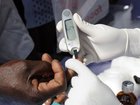A simple urine test could soon reveal more about a person's bones than X-rays, U.S. researchers said Tuesday after publishing results of an early phase study funded by NASA.
The technique could help astronauts cope with the bone loss that can occur in weightless environments like space, but may also have broad implications for people who suffer from osteoporosis or cancers that may spread to the bones.
 Full Story
Full Story
A young Georgia woman battling a flesh-eating disease could hardly believe it when she was able to speak Sunday for the first time since she was taken to an Augusta hospital more than three weeks ago, her father said Monday.
"Hello. Whoa. Wow, my mind is blown," were Aimee Copeland's first words Sunday morning to her sister and mother, her father said in a phone interview Monday with The Associated Press. Andy Copeland was in church at the time and had to wait until a later visitation time Sunday evening to hear his daughter's voice.
 Full Story
Full Story
A 10-year-old Cambodian girl has died from bird flu, the World Health Organization said Monday, the country's third fatality from the virulent disease this year.
The child developed a fever and shortness of breath on May 20 and died on Sunday, the WHO said in a joint statement with the Cambodian health ministry.
 Full Story
Full Story
Starved of funds and medicine during decades of military rule, doctors at a clinic in Yangon offer their usual advice to one of Myanmar's newest HIV patients -- come back when you're sicker.
In a country with one of Southeast Asia's biggest armies but a healthcare system in tatters, scarce antiretroviral drugs are given only to those with the advanced form of the illness.
 Full Story
Full Story
Chile's government has ordered about half a million pigs to be evacuated from a meat processing plant where they were abandoned, prompting locals to riot over foul odors, local media said Saturday.
Residents in the town of Freirina, 800 kilometers (500 miles) north of Santiago in the parched Atacama region, have cut off access roads to the pig slaughterhouse.
 Full Story
Full Story
French smokers have formed a lobby to "defend their rights" against what they perceive as unfair curbs imposed by the state, the group's leaders said Sunday.
The Union for the Rights of Adult Smokers (UDFA) says it represents a potential 12.5 million voters and intends to fight against the spread of no-smoking zones or rising cigarette prices.
 Full Story
Full Story
Australia said Friday it would "vigorously defend" itself against complaints about its plan for plain cigarette packaging made by Honduras and Ukraine to the World Trade Organization.
The action was launched by Ukraine at the WTO in March and Honduras joined the following month, according to the global trade arbiter.
 Full Story
Full Story
Chile will soon cover sex change surgeries under its public health plan in order to allow citizens of limited means to "recover their true sexual identity," Health Minister Jaime Manalich said.
Until now such operations were only offered in private clinics at a cost of $20,000 to $30,000, but will now be performed in public hospitals in the capital Santiago, Concepcion and Valparaiso, he said late Thursday.
 Full Story
Full Story
The World Health Organization announced on Friday it was set to approve a new target to reduce premature deaths from chronic illnesses such as heart disease by a quarter by 2025.
Cardiovascular disease, diabetes, cancer and chronic respiratory conditions are known in medical terms as no communicable diseases (NCDs) and represent the world's biggest killers -- accounting for 63 percent of all deaths.
 Full Story
Full Story
After decades of indifference, big businesses and the government are turning up the heat on smokers in South Korea, a nation with one of the developed world's highest male smoking rates.
Some firms are pressing workers to kick the habit or miss out on promotion and the health ministry will toughen warnings on cigarette packs.
 Full Story
Full Story



